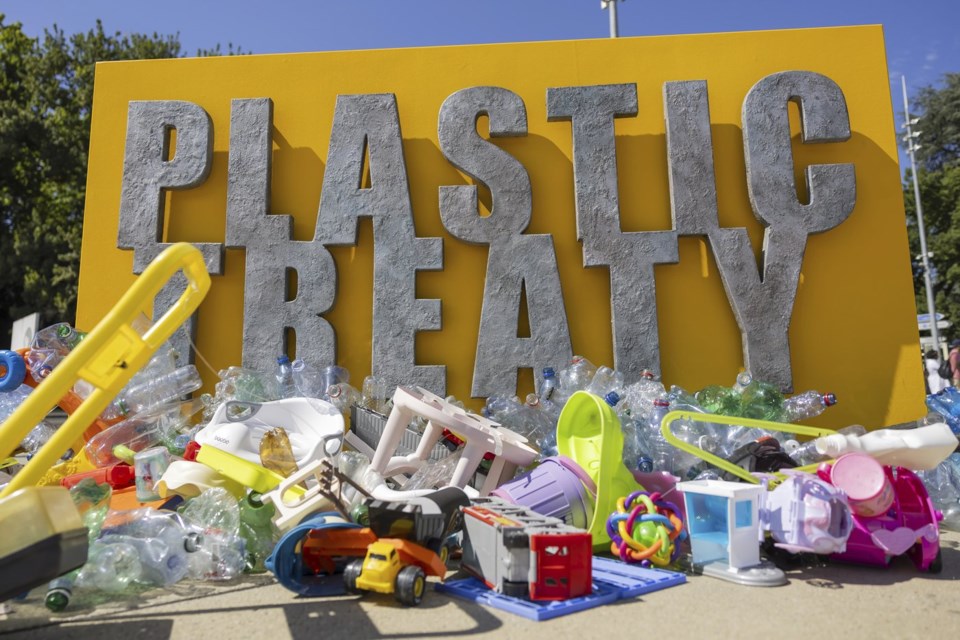Under President Donald Trump's leadership, the United States has withdrawn from international negotiations and commitments, particularly around climate. But the U.S. is very much involved in treaty talks for a global accord to end plastic pollution.
Nations kicked off a meeting Tuesday in Geneva to try to complete a landmark treaty over 10 days to end the spiraling plastic pollution crisis. The biggest issue is whether the treaty should impose caps on producing new plastic, or focus instead on things like better design, recycling and reuse. About 3,700 people are taking part in the talks, representing 184 countries and more than 600 organizations.
Here is a look the U.S. position:
Why is the US participating in the negotiations?
Hours after he was sworn in to a second term, Trump pulled the U.S. out of the landmark Paris agreement to combat global warming. The United States didn't participate in a vote in April at the International Maritime Organization that created a fee for greenhouse gases emitted by ships, or send anyone to the U.N. Ocean Conference in June.
Some wondered whether the United States would even go to Geneva.
The State Department told The Associated Press that engaging in the negotiations is critical to protect U.S. interests and businesses, and an agreement could advance U.S. security by protecting natural resources from plastic pollution, promote prosperity and enhance safety.
The industry contributes more than $500 billion to the economy annually and employs about 1 million people in the U.S., according to the Plastics Industry Association.
“This is an historic opportunity to set a global approach for reducing plastic pollution through cost-effective and common-sense solutions and fostering innovation from the private sector, not unilaterally stopping the use of plastic,” the department said in an email.
What does the US want in the treaty?
The State Department supports provisions to improve waste collection and management, improve product design and drive recycling, reuse and other efforts to cut the plastic dumped into the environment.
The international Organisation for Economic Co-operation and Development estimates that 22 million tons of plastic waste will leak into the environment this year. That could increase to 30 million tons annually by 2040 if nothing changes.
The OECD said if the treaty focuses only on improving waste management and does nothing on production and demand, an estimated 13.5 million tons of plastic waste would still leak into the environment each year.
What does the US not want in the treaty?
The United States and other powerful oil and gas nations oppose cutting plastic production.
Most plastic is made from fossil fuels. Even if production grows only slightly, greenhouse gas emissions emitted from the process would more than double by 2050, according to research from the federal Lawrence Berkeley National Laboratory.
The U.S. does not support global production caps since plastics play a critical role throughout every sector of every economy, nor does it support bans on certain plastic products or chemical additives to them because there is not a universal approach to reducing plastic pollution, the State Department said.
That’s similar to the views of the plastics industry, which says that a production cap could have unintended consequences, such as raising the cost of plastics, and that chemicals are best regulated elsewhere.
What has the US done in Geneva so far?
On the first day of the negotiations, the United States proposed striking language in the objective of the agreement about addressing the full life cycle of plastics. That idea was part of the original mandate for a treaty. Getting rid of it could effectively end any effort to control plastic supply or production.
Under former President Joe Biden's administration, the U.S. supported the treaty addressing supply and production.
What are people saying about the US position?
Industry leaders praised it and environmentalists panned it.
Chris Jahn, president and CEO of the American Chemistry Council, said the Trump administration is trying to get an agreement that protects each nation's rights while advancing effective and practical solutions to end plastic waste in the environment. He said his group supports that approach.
Graham Forbes, head of the Greenpeace delegation in Geneva, said the United States wants a weak agreement and is undermining the idea that the world needs strong international regulations to address a global problem.
Does the US think the world can agree on a treaty that will end plastic pollution?
The United States aims to finalize text for a global agreement on plastic pollution that all countries, including major producers of plastics and plastic products, and consumers, will support, the State Department said in its statement.
___
The Associated Press’ climate and environmental coverage receives financial support from multiple private foundations. AP is solely responsible for all content. Find AP’s standards for working with philanthropies, a list of supporters and funded coverage areas at AP.org.
Jennifer Mcdermott, The Associated Press



